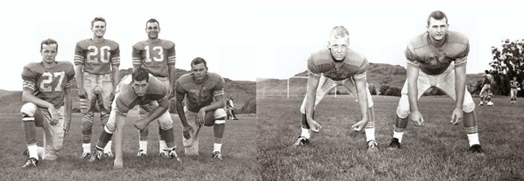| |
| |
A History Of Winning |
| Expecting Great Things is at the Core of CLU |
| |
When Richard Pederson, the farmer who owned the land on which CLU was developed, responded to CLU’s first president, Orville Dahl’s knock on his door in 1957; he said, “I have been expecting you.” In providing the land, Pederson’s goal was simple: “I want to provide youth with the benefits of a Christian education in a day when spiritual values may well decide the course of history.” Since that time CLU has never wavered. Expecting great things has always been at the core of CLU and it has remained steadfast in defining and being faithful to its spiritual values.
Orville Dahl wasted little time in making the development of a first class athletic program a high priority in CLU’s first year. He hired a visionary athletic director, Luther Schwich, and then set about the task of recruiting Coach Shoup as the University’s founding football coach. Coach Shoup in turn brought with him Don Garrison, who was not only a successful and charismatic coach in his own right, but like Shoup a person of deep personal faith. The Shoup’s (Bob and Helen) arrived on the campus in the spring of 1962 and immediately set about the task of recruiting the first football team. Along the way he recruited a couple of faculty members, James Kallas, a religion professor with professional football in his background, and Robert Hague, a Dean at the college to help him. All of these men became legends in their own right with regard to the development of both the football program and the academic tradition of the University.
|
| |
 |
| |
In the fall of 1962 the first recruits showed up and we saw the official launch of the CLU football program. It was certainly “bare bones”. There were no fields on which to practice. The gym was under construction, so Beta Hall, the men’s residence hall at the time, served as the locker room until Mountclef Hall was finished that same fall. There was no nickname, no mascot and no fight song. We started with two practices a day. There was no hot water in the residence hall. The practice field was a small grassy area located where Alumni House (the Pederson home) is now located on campus. Eventually we were able to practice at Camarillo High School. Traveling to practice in the bus, affectionately called “The White Tornado” and driven by Norm Denison, was in and of itself an adventure in survival.
In the great CLU tradition, players, coaches and students didn’t know what they didn’t have. The team’s 1962 record 3 4, wasn’t as important as the commitment and dedication of those first players and coaches. Most of the players came from very competitive high schools and community college programs. They were used to winning and having great facilities, traditions, a fight song, a band and cheerleaders backed by a large and faithful student body that had come to the same home field for years.
While the first team began its inaugural season with no homefield, Orville Dahl, Bob Shoup, and representatives from the Los Angeles Times were able to attract a new NFL team, the Dallas Cowboys, to the campus for their summer camp. Working with the Cowboys, the University was able to fast track the development of better locker rooms and training facilities as well as the creation of the first home field and adjacent practice fields on the north campus. |
| |
|
| |
For the next 26 years these two organizations, the CLU Kingsmen and the Dallas Cowboys grew into very competitive and nationally recognized football teams. Each team reached the pinnacle of achievement in competition by winning their own versions of the national championship. The Cowboys helped put the city of Dallas on the map and Kingsmen football helped to promote and develop brand identity for this new fledgling university in the southwest. Tom Landry was a man of faith and high spiritual values as was coach Shoup and coach Garrison.
In 1962 neither the Cowboys nor the Kingsmen had much to work with in terms of facilities, but it didn’t matter. CLU players and those students and faculty were attracted to those intangible things they saw in the school’s future; perhaps that’s why they are today affectionately referred to as “the pioneers”. They pioneered. That’s what they did. They laid the groundwork for an educational culture of high expectations, of excellence in scholarship and…a history of winning! |
| |
| |
| |
|
|
